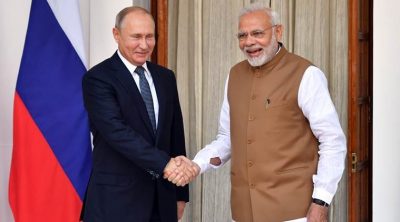India Buying Russian S-400s Air Defense Systems, Defies US Sanctions Threat

In New Delhi on Friday October 4, 2018, Russia’s President Putin and India’s Prime Minister Modi signed a $5.4 billion agreement to purchase five S-400 air defense systems, delivery scheduled for 2020 – ignoring the threat of possible US sanctions.
Asked if the deal was consummated, Putin spokesman Dmitry Peskov responded: “Yes, on the sidelines of the visit.”
Putin aide Yuri Ushakov said
“India will have a modern air defense system boasting parameters that surpass those of similar systems of other countries.”
During a Friday press conference, Modi said
“India and Russia believe that it is necessary to consolidate the multipolar world and multipolar relations,” adding:
between both countries and others.
Last July, Indian Defense Minister Nirmala Sitharaman said that New Delhi and Moscow reached the final stage in talks on the S-400 purchase.
It’s able to destroy multiple hostile aircraft, ballistic missiles, and other aerial targets up to 250 miles away. No other nations match the its capability.
The deal is one of more to come. India contracted with Russia to build six nuclear power plants, Russia’s Rosatom to construct the new facilities, a press release by the company saying:
“The parties plan…to develop the project on construction of six Russia-designed nuclear power plant units in India at the new site, to expand cooperation in third countries, and cooperate in new promising areas in the nuclear power industry.”
Rosatom CEO Aleksey Likhachev and Indian Atomic Energy Commission Chairman Kamlesh Nilkanth Vyas signed the deal on Friday – plants reportedly to be built in southeast India’s Andhra Pradesh.
Russia and India are key nuclear energy partners. In 1988, Soviet Union and New Delhi officials agreed to build the country’s largest nuclear power facility.
Construction began in 2002, completed in 2013, since then the plant expanded, further expansion planned.
On Friday, Putin said
“(w)e are ready to consider the possibility of cooperation in the framework of such programs as Far East LNG, Arctic LNG-2, as well as other projects for the development of natural resources of Siberia, Yamal and the continental shelf in the Russian Federation,” adding:
Both countries intend expanding trade to $30 billion by 2025, threefold the current level, Putin saying the following on Friday:
“We set out to boost trade turnover to $30 billion by 2025 and mutual investments to $15 billion some time ago.”
“In this regard, we were satisfied to note that last year mutual trade turnover went up by 21% exceeding $9 billion, and gained another 20% in seven months of this year.”
“If we continue at this pace, not only will we meet the targets but we’ll reach them earlier than expected and (will) continue onward.”
Documents signed on Friday are all about “longterm expansion of bilateral ties in various areas.”
On Thursday, India’s Cabinet Committee on Security (CCS) approved the purchase of four Russian-made frigates, costing around $2 billion – two built in Russia, two others in India.
On Wednesday, State Department spokeswoman Heather Nauert “urg(ed) all of our allies and partners to forgo transactions with Russia that would trigger sanctions under CAATSA (Washington’s Countering America’s Adversaries Through Sanctions Act).”
A New Delhi statement said it’s devising ways to circumvent potential US sanctions. It may trade with other countries in local currencies, avoiding dollar transactions, possibly trading Indian products for foreign ones purchased.
A Final Comment
On Thursday, Reuters reported that Indian purchases of US oil are “down 75 percent from a record high of 347,000 barrels in June,” adding:
Last month (September), “Indian buyers lifted purchases of Iranian crude to 502,000 bpd, up 111,000 bpd over August.”
The country is one of the two top buyers of Iranian crude. According to OilPrice.com,
“India will buy a total of 9 million barrels of oil from Iran in November” – despite imposition of new US sanctions on the 4th, aiming to halt all Iranian oil exports, a scheme doomed to fail.
“India wants to keep importing oil from Iran, because Tehran offers some discounts and incentives for Indian buyers at a time when the Indian government is struggling with higher oil prices and a weakening local currency that additionally weighs on its oil import bill,” OilPrice.com added.
It’s unclear how much Iranian oil India intends to keep buying. New Delhi is one of America’s largest trading partners, bilateral dealings totaling $140 billion in 2017.
Will the Trump regime jeopardize relations by imposing sanctions for the country’s trade with Russia and Iran?
Reportedly it’s considering waivers for India and other countries, likely including Japan and South Korea.
Last month, Pompeo said the US is “prepared to work with countries that are reducing their imports (from Iran and Russia) on a case-by-case basis.
On Thursday, Bolton stressed there’d be no waivers while admitting the aim to block all Iranian oil exports is unattainable. The same goes for Russian exports.
*
Note to readers: please click the share buttons above. Forward this article to your email lists. Crosspost on your blog site, internet forums. etc.
Award-winning author Stephen Lendman lives in Chicago. He can be reached at [email protected].
His new book as editor and contributor is titled “Flashpoint in Ukraine: US Drive for Hegemony Risks WW III.”
http://www.claritypress.com/LendmanIII.html
Visit his blog site at sjlendman.blogspot.com.
Stephen Lendman is a Research Associate of the Centre for Research on Globalization (CRG)

